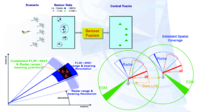
Photo from wikipedia
ABSTRACT In this paper, a fusion estimation problem in clustering sensor networks under stochastic deception attacks is investigated. The sensors are divided into several clusters, and a local estimator is… Click to show full abstract
ABSTRACT In this paper, a fusion estimation problem in clustering sensor networks under stochastic deception attacks is investigated. The sensors are divided into several clusters, and a local estimator is embedded in each cluster. During the network transmissions, deception attacks are considered to randomly occur and the statuses of the attacks are described by a set of Bernoulli variables. By using the clustering sampled information, a local minimum variance filter is derived and the filter gains are recursively determined. By using the local estimates and the local estimation error covariance matrices, a covariance intersection fusion algorithm is presented for the fusion centre to generate the final estimate. Moreover, the relationship between the trace of the local estimation error covariance matrix and the uniform successful attack rate is analysed. An illustrative example is given to shown the effectiveness of the proposed theoretical results.
Journal Title: International Journal of Systems Science
Year Published: 2018
Link to full text (if available)
Share on Social Media: Sign Up to like & get
recommendations!